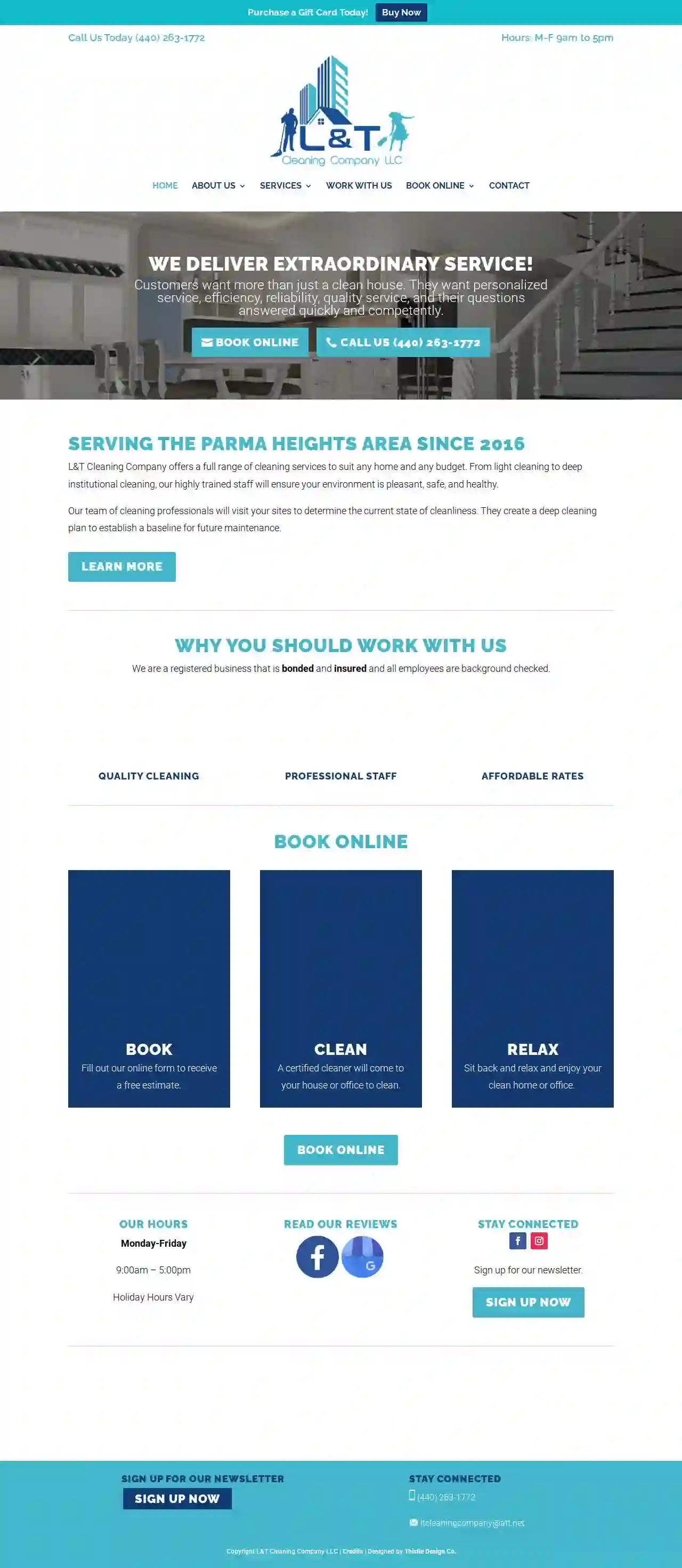Commercial Cleaning Franklin
Find top Janitorial Services in Franklin
Receive multiple Office Cleaning quotes for your project today! Compare profiles, reviews, accreditations, portfolio, etc... and choose the best service.

Clevelands Clean Team LLC
513 reviews4160 Pearl Road #609073, Cleveland, 44109, USCleveland's Clean Team is a reliable and trustworthy cleaning services provider, offering a wide range of services to fit your personal needs. From residential to commercial, we promise quality, reliable, and incomparable cleaning services you can trust. Our products and services are high-quality, safe, and guaranteed! We understand that everyone has unique cleaning needs, and we are committed to giving you a piece of mind knowing that your space has been properly and professionally cleaned. We are currently using EPA-recommended products that help protect against viruses, disease, and bacteria. We also have green products upon request as well as clear and free options for those with a sensitivity or dislike of more traditional products.
- Services
- Why Us?
- Gallery
Get Quote
Corvus Janitorial Systems
4.420 reviewsCleveland, US- Services
- Why Us?
- Gallery
Get Quote
CleanNet of Cleveland Inc.
2.86 reviewsCleveland, US- Services
- Why Us?
- Gallery
Get Quote
Mega Kleen Janitorial Inc.
4.37 reviewsCleveland, US- Services
- Why Us?
- Gallery
Get Quote
Maid Brigade of Knoxville
3.915 reviewsKnoxville, US- Services
- Why Us?
Get Quote
Cleaning Concepts
4.912 reviewsChattanooga, US- Services
- Why Us?
Get Quote
AB Cleaning LLC
53 reviewsChattanooga, US- Services
- Why Us?
Get Quote
L&T Cleaning
542 reviewsCleveland, US- Services
- Why Us?
Get Quote
Ascent Cleaning Solutions, LLC
4.815 reviewsNashville, US- Services
- Why Us?
Get Quote
Premier Cleaners
519 reviewsMurfreesboro, US- Services
- Why Us?
Get Quote
Over 60,241+ Cleaning Contractors on our platform
Our janitorial contractors operate in Franklin and surroundings!
CleaningMatch has curated and vetted the Best Cleaning Services arround Franklin. Find a trustworthy business today.
Frequently Asked Questions About Commercial Cleaning
- Robotic cleaners: Automated cleaning robots can handle routine tasks, freeing up human staff for specialized cleaning.
- Automated dispensing systems: Precise chemical dispensing reduces waste and ensures consistent cleaning solutions.
- Data-driven cleaning management: Software platforms track cleaning schedules, monitor performance, and optimize cleaning routes.
- Smart cleaning solutions: Sensors and IoT devices monitor building occupancy and adjust cleaning schedules accordingly.
- Eco-friendly products: Using cleaning solutions made with sustainable, biodegradable, and non-toxic ingredients.
- Minimizing waste: Reducing packaging, using reusable materials, and implementing recycling programs.
- Energy efficiency: Employing energy-efficient equipment and practices.
- Improved indoor air quality: Avoiding harsh chemicals that can contribute to poor air quality.
- Using the wrong cleaning products: Harsh chemicals can damage certain surfaces. Choose appropriate cleaners.
- Neglecting hard-to-reach areas: Thoroughly clean behind furniture, under desks, and other often-missed spots.
- Improper disinfection protocols: Follow proper dwell times for disinfectants to effectively kill germs.
- Poor communication: Clearly communicate expectations and provide feedback to your cleaning service.
- Lack of inspections: Regularly inspect the work to ensure standards are met.
- Establish clear expectations upfront:
- Regularly inspect the work:
- Provide feedback to the cleaning company:
- Address any concerns promptly:
- Establish a clear communication channel:
- Conduct periodic performance reviews:
How is technology changing the way businesses approach cleaning?
What is green cleaning, and why should I consider it?
What are some common commercial cleaning mistakes to avoid?
How can I ensure the quality of the commercial cleaning I receive?
How is technology changing the way businesses approach cleaning?
- Robotic cleaners: Automated cleaning robots can handle routine tasks, freeing up human staff for specialized cleaning.
- Automated dispensing systems: Precise chemical dispensing reduces waste and ensures consistent cleaning solutions.
- Data-driven cleaning management: Software platforms track cleaning schedules, monitor performance, and optimize cleaning routes.
- Smart cleaning solutions: Sensors and IoT devices monitor building occupancy and adjust cleaning schedules accordingly.
What is green cleaning, and why should I consider it?
- Eco-friendly products: Using cleaning solutions made with sustainable, biodegradable, and non-toxic ingredients.
- Minimizing waste: Reducing packaging, using reusable materials, and implementing recycling programs.
- Energy efficiency: Employing energy-efficient equipment and practices.
- Improved indoor air quality: Avoiding harsh chemicals that can contribute to poor air quality.
What are some common commercial cleaning mistakes to avoid?
- Using the wrong cleaning products: Harsh chemicals can damage certain surfaces. Choose appropriate cleaners.
- Neglecting hard-to-reach areas: Thoroughly clean behind furniture, under desks, and other often-missed spots.
- Improper disinfection protocols: Follow proper dwell times for disinfectants to effectively kill germs.
- Poor communication: Clearly communicate expectations and provide feedback to your cleaning service.
- Lack of inspections: Regularly inspect the work to ensure standards are met.
How can I ensure the quality of the commercial cleaning I receive?
- Establish clear expectations upfront:
- Regularly inspect the work:
- Provide feedback to the cleaning company:
- Address any concerns promptly:
- Establish a clear communication channel:
- Conduct periodic performance reviews: